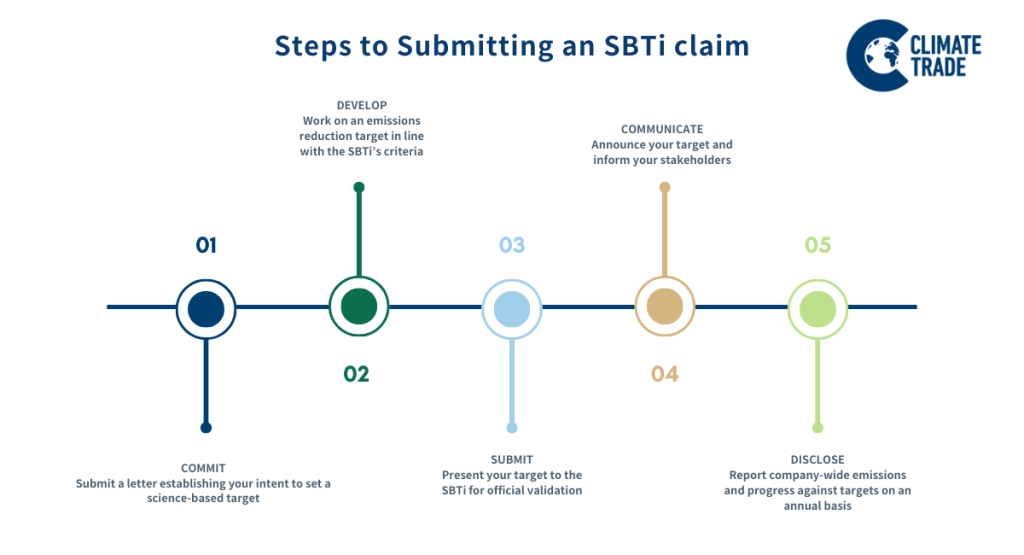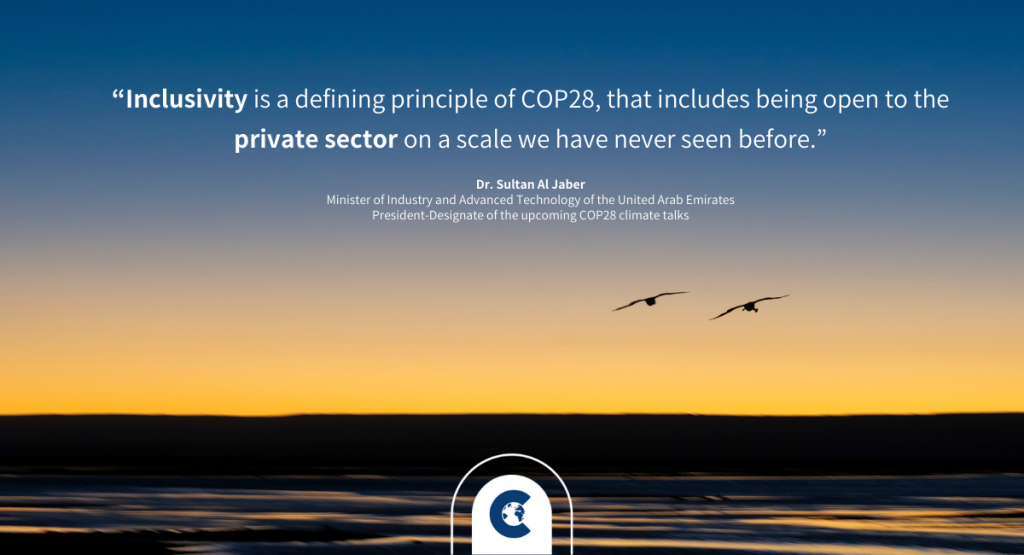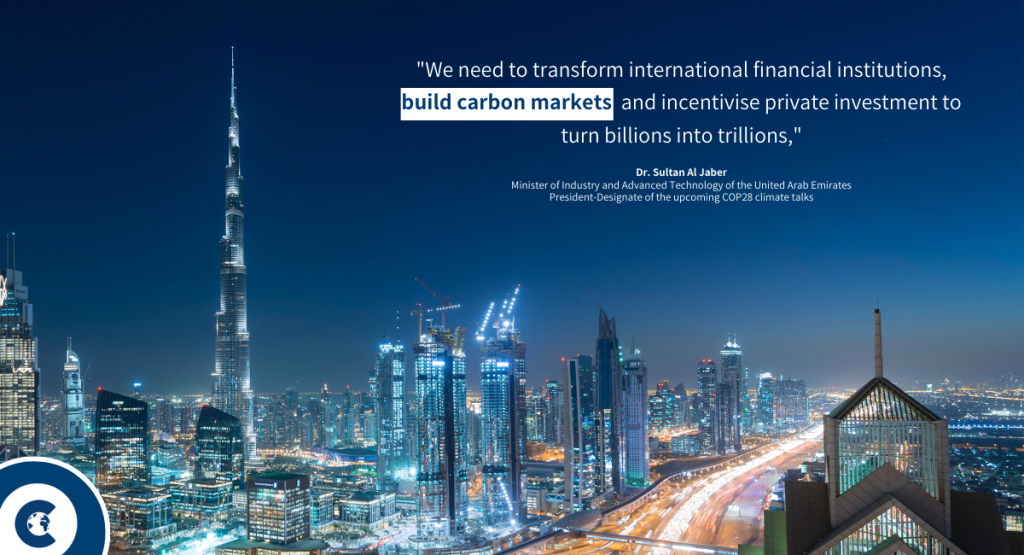The private sector holds a unique opportunity to channel vital funds towards climate change.
As the global community gears up for COP28, the private sector finds itself at the forefront of the battle against climate change. With the threat of missing the 1.5°C climate target outlined in the Paris Agreement, the urgency for businesses to adopt climate-friendly practices has never been greater. We explore why the private sector should pay close attention to COP28 and how they can actively participate in global decarbonization efforts.
The transformation to climate-friendly business practices is both necessary and transformative. Every industry sector will be impacted, and companies that proactively adapt will discover new business opportunities, while those who lag behind may face risks. At ClimateTrade, our customers span a diverse set of industries, and we have witnessed first hand a growing readiness among companies to scale up climate action, aligning with the requirements to meet global climate targets. The problem is, despite their best intentions, they don’t always know where to start, and the complexities around the carbon market can be off putting.
Climate Challenges Faced by the Private Sector
Despite the growing awareness, private sector climate action remains timid. One significant hurdle is the price of emissions and the uncertainty surrounding carbon credits as an efficient form of climate action. Some critics argue against carbon credits, labeling them as ‘greenwashing,’ and insist that companies should strive for full decarbonization rather than relying on compensatory measures. However, the reality is that achieving zero emissions at an affordable cost is currently beyond the reach of many companies and in some industries, impossible to achieve.
The Role of Carbon Credits in Global Decarbonization
Contrary to accusations of greenwashing, utilizing carbon credits can be a legitimate strategy for companies committed to science-based targets and roadmaps for decarbonization. The Voluntary Carbon Market provides an efficient, cost-effective, and transparent way for companies to offset residual emissions and contribute to global decarbonization. Carbon compensation, when aligned with rigorous standards, such as the Net-Zero Standard set out by SBTi, accelerates climate action while companies await the development of further climate-friendly technologies.

The Benefits of Voluntary Carbon Markets
Encouraging companies to voluntarily achieve climate neutrality by setting net-zero targets and compensating for residual emissions through certified carbon credits offers several advantages. Firstly, it provides governments with confidence to implement stronger regulations on carbon pricing, signaling the necessary transformation of the wider economy. Secondly, proactive corporate action positions companies favorably when broader climate regulations are introduced, demonstrating a commitment to urgently address climate change.
To build a solid Net Zero and Nature Positive strategy, we need to focus on biodiversity projects and credits. These projects, along with voluntary biodiversity markets, are crucial for tackling both climate change and biodiversity loss. Think of Science-Based Targets for Nature (SBTN) as the equivalent of our familiar climate goals, and the Task Force on Nature-related Financial Disclosures (TFND) as the counterpart to the Science-Based Targets Initiative (SBTi). By embracing these approaches, we pave the way for a more sustainable and resilient future.
COP28 and Private Sector Finance
The call for private sector involvement in climate finance has been amplified by COP28 President-Designate, Dr. Sultan Al-Jaber. As the first COP president to ring the bell at the New York Stock Exchange, Dr. Al-Jaber emphasized the critical role the private sector plays in sustainable climate finance. He urged collaboration between the public and private sectors to create innovative mechanisms that lower risk and expand private investment in clean projects.
As the private sector navigates the challenges posed by climate change, COP28 stands as a critical moment. The call for a new era of sustainable climate finance emphasizes the urgent need for private sector leadership. Companies that embrace climate-friendly practices, including the use of carbon credits, can contribute significantly to global decarbonization efforts. The private sector’s proactive role would not only align with the objectives of the Paris Agreement but would also position businesses to thrive in a world that demands sustainable and responsible practices.

Persuading Private Sector Investment in Climate Solutions
The United Arab Emirates, as it assumes the presidency of COP28, faces the difficult task of rallying private sector support to meet the financial demands of climate action. With the UN estimating an annual requirement of $4 to $6 trillion for investments in low-carbon infrastructure to align with the Paris Agreement’s 2° warming targets, the emphasis on private investment is becoming mission critical. The sheer scale of this financial need highlights the fact that relying solely on individual government pledges is simply not enough. Sultan Al Jaber´s recent comments on COP28 being open to the private sector on a scale never seen before confirms this commitment.
One strategic avenue for the UAE’s COP28 presidency to garner private sector involvement is by addressing the cost of capital for projects that aim to reduce emissions. The cost of capital, representing the return for investors in a project, is influenced by the perceived risk. In various sectors such as renewable energy, energy efficiency, and electric transport, if the cost of capital can be lowered for projects focused on carbon mitigation in emerging markets, it would make these projects more financially accessible. This, in turn, could lead to increased investment, resulting in the development of more clean infrastructure and reduced emissions.

ClimateTrade at COP28
This will be our sixth COP and we are proud to be part of an industry that is gaining global recognition, particularly in a year when climate change and its devastating effects have dominated the news. Since our inception in 2017, we have championed private sector participation as a key driver to global decarbonization. As our platform and integrated technologies have evolved we are committed to making climate action accessible to everyone. As a climate tech company we believe this is our responsibility, just as it is the responsibility of private sector businesses to play an active role in helping us reach climate targets. The voluntary carbon market has unprecedented potential to support climate solutions and our presence at COP28 will help us to showcase some of the most innovative technologies utilizing a wide range of methodologies to capture and store carbon as well as protecting and restoring our planet’s biodiversity.
Javier Santoyo,Commercial Development Director – Europe for Climate Trade said “This COP needs to deliver, it needs to be a turning point, if we want to avoid catastrophic consequences for humanity in general and businesses in particular. The window of opportunity is closing, we are well into the crucial decade for climate action. Moreover, in the face of geopolitical turmoil, which might hamper agreements between the parties (countries) and exacerbate the debate about who pays for what, businesses need to use their influence and more importantly, the ability to innovate, design and execute, to push for an agreement that places us on the right path. The difference now between those businesses that take on the gauntlet will be the difference between the business leaders and laggards of the future”








